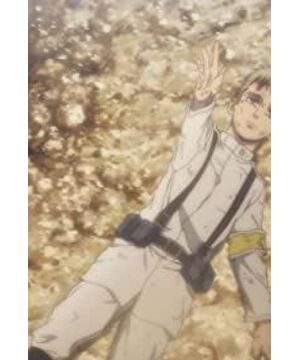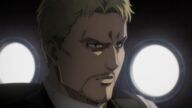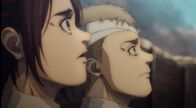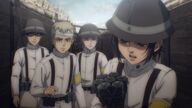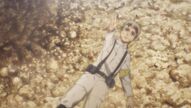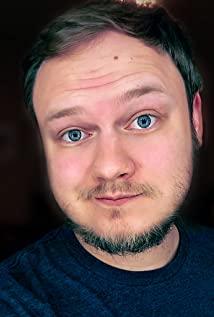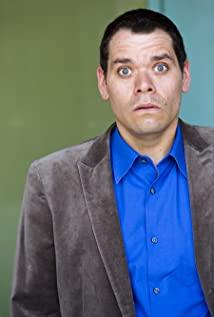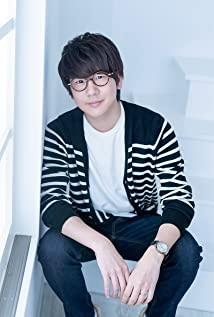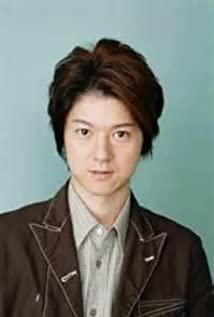From beginning to end, "Attack on Titan" is shrouded in a haze of oppression that is difficult to dispel: people in the show understand each other, but understanding is not helpful in resolving disputes, peace is fragile and relative, and conflict and conflict are Cannibalism is eternal and inevitable, and no matter what kind of good motives, it is difficult to avoid a bloody ending. This is in addition to "freedom", another theme that runs through the whole play-horror.
Why is freedom associated with terror?
Because in the cruel world of giants, the freedoms of different interest groups compete and conflict with each other, and the realization of one person's freedom must be at the cost of other people's disasters. And terror is a direct consequence of this law of the jungle. When Reiner first revealed his identity and made a declaration of destroying walls and destroying human beings, in Allen's eyes, he had become an out-and-out terrorist. But in another context on the other side of the ocean, he who made this confession was called a freedom fighter.
Birth of terror
Attack on Titan isn't the first to associate freedom with fear. In the real world, the word "terrorism" also originated from one of the most liberal orgy of all - the French Revolution. In order to defend the achievements of the revolution, the Jacobins passed a resolution to "terrorize all conspirators" and use extreme means to impose thunder and hammer on counter-revolutionaries. It was the first time the word "terrorism" entered the stage of history as a description of a strategy of struggle.
What is terrorism? Or where is the boundary between it and the general act of war?
The academic community generally believes that it includes the following three characteristics:
One is to achieve political demands;
The second is to create terror;
The third involves violent attacks on civilians and civilian facilities.
Article 3: Whether or not civilians are involved is an important feature that distinguishes terrorism from conventional warfare. So guerrilla warfare is not terrorism, the capture of the Bastille is not terrorism, neither is the Verdun meat grinder, and regardless of casualties, these practices do not attack civilians and violate the laws of war. The Jacobite massacre of the opposition is terrorism, and 9/11 is also terrorism, because they have the same political purpose as war, but they target civilians rather than violent institutions, making its consequences extremely tragic and the fear it spreads extremely high powerful.
And this is precisely the reason why "Attack on Titan" feels so cruel. The main characters represented by Allen have experienced tragic lives ravaged by terrorist actions. At the beginning of the first part, the Marais breaking the Wall of Maria, and in the second part Ellen's attack on the civilian containment area of Eldia are not just acts of war, but involve huge civilian casualties and become terrifying humanitarian disaster. Helpless refugees, collapsed buildings, congested traffic, corpses everywhere, and constant whining. These two symmetrical events are 9/11 in the world of giants, forever changing the lives of countless people.
But when the consequences of terrorism are so tragic, why do some people still cling to such acts?
weapon of the weak
After the failed European revolutions of 1848, Karl Heinz concluded in The Assassination: "The ruling authorities are too strong and cruel for popular revolts to have any chance of success. Under these circumstances, revolutionaries must accept assassination as the main tool of historical progress, which is also 'an unavoidable tool needed to achieve historical purposes'." This passage explains why terrorism as a radical strategy of struggle is often used by the weaker Adoption, and is often associated with revolution and rebellion. Behind it is the desperate psychology of the weak in despair and helplessness. Since liberty is often the appeal of the weaker rebels, terror is often the last resort of the weaker. This is why what one side sees as a terrorist is the other's "freedom fighter".
And in order to get rid of the guilt brought about by terrorist acts, organizers will rationalize the importance of extreme measures with a more radical attitude, creating an environment where they have no choice for their actions. During the French Revolution, Robespierre, the leader of the Jacobin Party, once said: "If the contribution of the government in peacetime is moral, then in the revolutionary period it is the community of morality and terror. Virtue without terror will be destroyed. And terror without virtue must be pale. Terror is nothing but the embodiment of legitimacy, timeliness, intensity and flexibility, the origin of morality." People believe that their actions are necessary evils and serve a larger and longer-term morality, and use this as a driving force to ruthlessly kill political enemies until they are destroyed in the same way.
And in Attack on Titan, Reiner drives himself in this way. He sees himself as a good warrior in the land of heroes, Marai, fighting to smash the conspiracy of the dark Eldia Empire. Destroying walls and killing civilians is when faced with the threat of the ancestor giants, they have no choice but to truly save the world. In Reiner's ideal self, he is not a terrorist: fighting for the world and the nation, he is a veritable "freedom fighter".
Such an idea may seem unassailable, but why did Reiner's beliefs still not protect him enough, and instead led him to long-term trauma?
Because like "freedom fighters" and "freedom fighters", strength and weakness, right and wrong, justice and evil, aggression and liberation are to some extent the product of human self-construction, and for those with the ability to think, they are not There is a black-and-white standard that it sticks to.
constructed truth
In the struggle between rebels and those in power, the war of public opinion never stops. Since the 21st century, the United States has mastered the right to speak and the occurrence of 9/11 has made terrorism a widely known derogatory term. The rebels also began to call themselves "freedom fighters", and they responded by calling it state terrorism in response to the title of "terrorist" given by the enemy.
The means of state terrorism are the same as those of generalized terrorism, except that the subject of its implementation is the state. Terrorists created 9/11, but the U.S. has done worse in Afghanistan since then. Is America's brutality around the world terrorism? Is it not because the state has the power to use force that it is not called terrorism? When the US lists countries like Iran as an axis of evil, they also accuse the US of state terrorism. Who is right and who is wrong? It probably depends on which narrative construction you believe in, and it's one of the main themes of the entire Attack on Titan discussion.
In Marai's narrative, Reiner and others act as freedom fighters against the state terrorism of the Eldia Empire and save the whole world; in their view, the Eldia Empire is a representative of terror, and they are justifiable Freedom fighters, in order to liberate the whole world from threats and to achieve equality and freedom for the Eldian nation;
In the narrative of the Yeager faction led by Allen many years later, it was the heroic Yeer faction freedom fighters who attacked Marais imperialism and fought tirelessly for national liberation; in their view, the Marais enslaved and slaughtered Al. Diaman is the personification of state terrorism and deserves to be crushed by the freedom-symbolizing Yeager faction.
The two completely different viewpoints both claim freedom and rebuke each other with terror, and the establishment of their respective logics depends on the construction of personal beliefs. This is also why exposure to two beliefs at the same time can be extremely painful, as Reiner and Allen are examples.
The pain of being split
Reiner's pain lies in the self-segmentation after accepting both narratives:
In the Marais narrative he is a freedom fighter fighting against the state terrorism of the dark Eldia Empire; but in the Eldian narrative he is a terrorist, a lackey of Marais state terrorism, A bloody executioner.
Unable to accept the conflict between the two ideas, Reiner went into madness and self-loathing in the trauma.
And the other is Ellen, Reiner's mirror image:
In the narratives of the Marais and the people of the world outside the island, he is a terrorist, a demon trying to destroy the world; but in the minds of the radical nationalists of Eldia, he is a freedom fighter, an avenger and a savior, destined to To break the shackles completely and free the people from eternal slavery.
But unlike Reiner, Allen is stronger and more able to reconcile the conflict between the two. He accepts that there is always conflict between people and believes that the freedom of different groups of people is difficult to achieve. This shows Allen's complexity:
On the one hand, he has the characteristics of conservatism, he is willing to accept the permanence of conflicts between people, admits that contradictions and conflicts cannot be reconciled, and refuses to believe that the free development of human nature can usher in peace;
On the other hand, he has a liberal side, in that he believes that although there are irreconcilable conflicts between people, they are equal in human nature, non-discriminatory, and can understand each other, and everyone has free development. , the power of choice;
In other words, Allen believes that people can communicate and understand, but does not believe that this understanding can replace war to eliminate conflict. Unlike Reiner, who has always been lost, he accepts the pain of separation, is a more radical actor, and becomes unstoppable as a result.
Epilogue
From the tragedy of the broken Wall of Maria to the tragedy of Eldia's containment area, the lingering terrorist elements from beginning to end make "Attack on Titan" shrouded in an inescapable sense of crisis and tragic atmosphere. Until the end, Allen triggered one of the most extreme global terrorist attacks, just to pursue the sacred "freedom" in his mind.
Switching seamlessly from terrorist to liberal, this work dramatizes how the way the mind is constructed affects how people see things. The same thing seems to different people to have very different results, and probably because of this, the term terrorism itself has no precise definition. But on the other hand, this is precisely the real horror of terrorism. As a strategy of struggle, it only needs the beliefs of believers and not the truth to gain infinite power, always reminding us that the crisis is never really far from human beings. Go, maybe all we're doing is delaying it for a day.
View more about The Other Side of the Sea reviews


